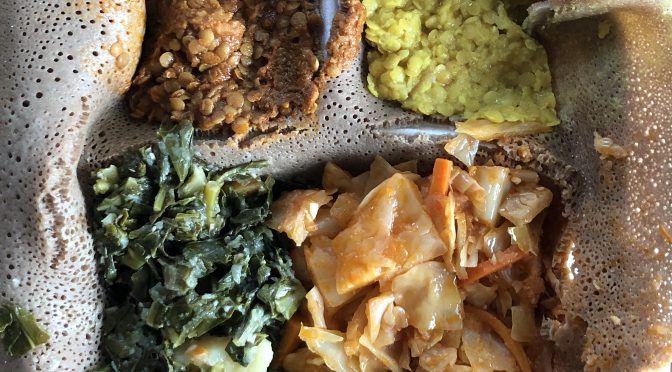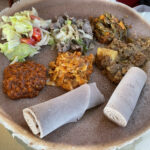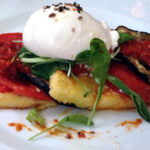If you like to eat Ethiopian food the traditional way, you’ll eat with your hands, tearing off pieces of tangy, tan injera flatbread and using it to grab morsels from the common plate while your friends are doing the same.
Unfortunately, the pandemic has put an end to that practice at Queen of Sheba restaurant for now. Dine-in service will be on individual plates only for now, the popular Ethiopian restaurant tells us on its online ordering page. Following standard protocols, customers must wear face masks when away from the table, and everyone is expected to practice social distancing.
But there’s an easy workaround if you want to eat with your fingers: Takeout is available with ordering online or by phone, and you can arrange delivery via Grubhub or Doordash. Once you’ve got your Ethiopian repast home, you’re welcome to dig in, and no one will judge you.
“We want to assure our customers that we are taking every precaution per health department guidelines to protect the spread of Covid-19 to our customers and employees by sanitizing all contact surfaces regularly and offering fast minimum contact transactions while keeping social distancing,” the restaurant assures us. “We have always provided our customers hand sanitizes at our door and tables for your convenience and protection. Let’s all be safe!”
That makes sense to me. I’m still resisting dining in anywhere until there’s a vaccine that works. But takeout? Yes, please! Queen of Sheba isn’t offering curbside pickup, but takeout orders are scheduled, and it’s easy to approach the pickup area without violating social distancing.
Queen of Sheba has been around for 16 years, operating briefly in a Frankfort Avenue storefront before moving in to its current location across from Bowman Field – once the home of the late, lamented Mazzoni’s – in 2008. The menu hasn’t changed much over the years.
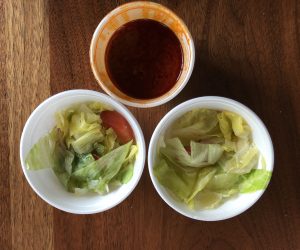
It starts with ten appetizers and salads, from $3 (for seneg karia, fresh jalapeños stuffed with an onion-tomato dressing) to $7.50 (for a four-item sampler).
Entrees are categorized by Ethiopian food style, including five wots (meat stews), six tips (sauteed chicken, beef, lamb, or fish), and four Queen’s Specialty items. Vegetarian dishes are popular in Ethiopia, where the Orthodox church requires abstinence from meat on both Wednesdays and Fridays, and Queen of Sheba steps up with eight meatless main dishes. Four combination plates wrap up the bill of fare and top out the menu pricing at $14.95 (for a tips and vegetable combination with injera or rice, salad, and red-lentil kik wot).
There’s also a short list of wines and beers, including the sweet Ethiopian honey wine called Sheba Taj, and a choice of three desserts (all $4).
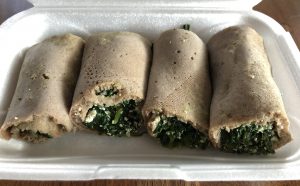
We chose combination plates so we could try more dishes, and drove away happy with a meat and vegetable combo ($13.95), vegetarian combination ($10.95), and an appetizer, a kosta wrap ($4) neatly packed in white plastic-foam boxes and tubs.
Four kosta wraps ($4) consisted of injera rolled and stuffed with a cool and refreshing mixture of fresh spinach lightly sauteed with chopped onions and garlic and mixed with crumbled Ethiopan aybe (house-made cottage cheese).
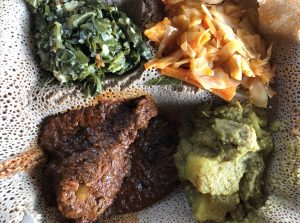
A meat and vegetable combination ($13.95) was built on a large round of injera pressed into a three-compartment box, then filled with portions of four items: Doro wot, alicha sega wot, gomen wot and atakilt, with the edges of the injera folded over the top.
Doro wot is a spicy chicken stew of chicken pieces slowly cooked in onions, garlic, and ginger with berbere, the iconic Ethiopian spice made with spicy hot peppers, cinnamon, and other spices. The long-simmered chicken drumstick was tender without being squishy and succulent.
Alicha sega wot is a mild stew of tender beef slices, potatoes, and onions with garlic, ginger, and turmeric. It reminded us of old-fashioned hash but with Ethiopian flavors.
If I have to eat my greens, I wouldn’t mind them being gomen wot. Cut-up collard greens were perfectly prepared, tender but not overcooked, simmered with onions and garlic.
Atakilt is another healthy and delicious vegetable dish: Sliced cabbage, onions, and carrots were cooked just right, tender and almost creamy but not boiled to death in a light tomato sauce that brought together all the flavors.
A vegetarian combination dinner ($10.95), pictured at the top of the page, was built on injera in the same way. It also bore portions of atakilt and gomen wot as well as two servings of lentil stew. Misir wot was made of yellow lentils simmered in onions, ginger and garlic with turmeric and aromatic herbs. Kik wot is green lentils similarly prepared but with fiery red berbere sauce in place of the turmeric.
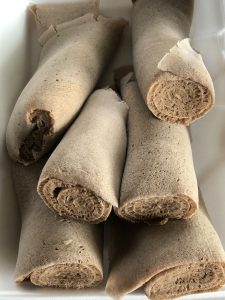
American-style salads served alongside both combo plates were cool and refreshing, with crisp, cool iceberg lettuce torn, not cut, into bite-size pieces. It was tossed with tomato slices and thinly sliced red onion, all dressed with a simple but tasty vinaigrette.
The kitchen seemed to assume that we would take advantage of dining at home to pitch in, Ethiopian-style: An extra box contained six extra rolls or injera, more than we knew what to do with.
An abundant Ethiopian dinner for two came to just $30.63, plus a 20 percent tip.
Queen of Sheba
2804 Taylorsville Road
459-6301
queenofshebalouisville.com
